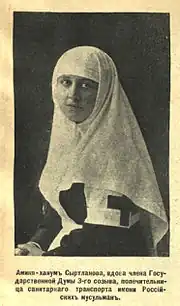Amina Hanum Syrtlanoff
Amina Hanum Syrtlanoff or Syrtlanova (in Russian: Амина Махмудовна Сыртланова, maiden name in Russian: Шейх-Али, in French: Cheik Ali, in English: Sheikh-Ali; 1884, city of Ufa, Russian Empire — after 1939, France) — public figure, sister of mercy, theosophist, mason.
Amina Hanum Syrtlanoff | |
|---|---|
| Амина Сыртланова | |
.jpg.webp) End of 1890s or beginning of 1900s. | |
| Born | Амина Махмудовна Шейхалиева 1884 |
| Died | after 1939 |
Biography

Born in 1884 in the family of Major General Mahmoud Magomedovich Shуikhaliyev (Sheikhali or Sheikh-Ali) and landowner Magiparvaz Sheikhaliyeva(maiden name Alkina). She was the niece of honorary Devlet Mirza Shikhaliyev (Sheikh-Ali), colonel, chief bailiff of Muslim peoples of Stavropol province, as well as prominent public figures Ibniamin Alkin and Seid Giray Alkin.
She married the 3rd Russian State Duma deputy Galiaskar Syrtlanov. After his tragic death in 1912, she took an active part in public life. She was chairman of the "Petrograd Muslim Educational Society" [2] and had a "large influence among the enlightened Moslems of Petersburg, as well as Ufa".[3]
After the beginning of the First World War, she became a member of the Central Committee of the Russian Muslim organizations, united Muslim charities for the support of Russian troops.[4] In the summer of 1916 she served as Matron of the Russian Muslims ambulance train sent to the War forefront.
After the Russian Revolution, Syrtlanoff emigrated to Finland. While there, she took part in the establishment of local Tatar congregation. During this time she was in contact with Finnish theosophists and advertised her services as a music teacher in the Finnish press. Syrtlanoff made presentations on Islam to different associations; she wanted to "clear the reputation of Prophet Muhammad to suspicious westerners".[5][6][7][8] Syrtlanoff was also known as ”Emine Sartlan” in Finland.[9][10]
Next, she traveled to France and settled in Paris. In 1926-1939, she made reports in French and Russian Theosophical Societies. From 1933-1935, deputy board member, since 1935 a board member of the Union of Russian nurses named after Vrevskaya in France. In 1935 she made reports in the society "Soul of Russia". From 1921 to 1929 she was a member of the International Masonic Order "Human Rights» (Le Droit Humain), engaged in the protection of civil rights.[11] In 1929 she became head of the Russian-speaking Lodge "Aurora", a constituent institution of this Order, and remained a member of the Lodge until 1939. She equated Theosophy to Freemasonry.[12] After the beginning of the German occupation of France and closing all Masonic Lodges on its territory,[13] her fate is unknown.
Family
Husband — Ali Oscar (Galiaskar) Shahaydarovich Syrtlanov (1875–1912), also referred as Aliasgar Sirtlanov in the English translation of the book of Zeki Velidi Togan,[14] member of the 3d State Duma of Russian Empire, a lawyer at the trial of Vice Admiral Rozhestvensky, Admiral Nebogatov and Lieutenant General Stessel, accused in the defeat of the Army and Navy in the Russian-Japanese War of 1904–1905.
Interesting Facts
In January 1926 the Lodge "Aurora", referring to the "rights of people", was created in Paris. This Lodge was not recognized by other Masonic Orders. The Lodge included both men and women and was headed by Nagrodskaya (1926–1928), Syrtlanova (1929), Brill (1930), Nagrodsky (1931).[15]
References
- Photo from the Illustrated Supplement to the newspaper "Novoe Vremya" June 1916, №14476
- Yamayeva L.А., Muslim liberalism of the beginning of the XX century as a political movement. Ufa, Gilem, 2002, pp. 209—210 (in Russian)
- Zeki Velidi Togan, Memoires: National Existence and Cultural Struggles of Turkistan and Other Muslim Eastern Turks, CreateSpace Independent Publishing Platform, 2011, p. 108.
- Yamayeva L.А., Muslim charities early twentieth century, «Vatandash», 2013, № 7 (in Russian)
- "Amina hanum in Finnish press, 1922".
- Stahlberg, Sabira (2022). "Visible and Invisible Tatar Women in Finland".
- Antero Leitzinger: Suomen tataarit — Vuosina 1868-1944 muodostuneen muslimiyhteisön menestystarina. East-West Books Helsinki, 2006. ISBN 978-952-99592-2-8
- Zinnetullah Ahsen Böre: Finlaniya Cemaati Islâmiyesin kurmaya muvaffak olsakta Fin-Türk mektebin açmaya neden muvaffak olmadık? / Olemme onnistuneet perustamaan seurakunnan, mutta miksi emme ole onnistuneet perustamaan suomalais-turkkilaista kansakoulua? (Tampere, 1943)
- Leitzinger, Antero: Suomen tataarit — Vuosina 1968-1944 muodostuneen muslimiyhteisön menestystarina. East-West Books, Helsinki 2006. ISBN 952-99592-2-2 (p. 172)
- Tervonen, Miikka & Leinonen Johanna (toim.): Vähemmistöt muuttajina — Näkökulmia suomalaisen muuttoliikehistorian moninaisuuteen. Painosalama Oy, Turku 2021. ISBN 978-952-7399-09-5. (pp. 77, 81)
- "Достопочтенная Ложа "Новый Свет" №1989, Масонский Смешанный Международный Орден LE DROIT HUMAIN (Право Человека). Русская интермедия: ложа Аврора (1927-1945)". Archived from the original on 2013-11-03. Retrieved 2014-02-22.
- Peshekhonov V.А., Far and near. Skulls and stars, 2010 (in Russian).
- Berberova N., People and Lodges. Russian Masons of the ХХ century. Moscow: Progress-Traditsiya, 1997 (in Russian).
- Zeki Velidi Togan, Memoires: National Existence and Cultural Struggles of Turkistan and Other Muslim Eastern Turks, CreateSpace Independent Publishing Platform, 2011
- Platonov О.А., Masonic conspiracy in Russia. Works on the history of Freemasonry. From the archives of the Masonic Lodges, the Police and the KGB. Moscow, Algoritm, 2011, p. 301 (in Russian)